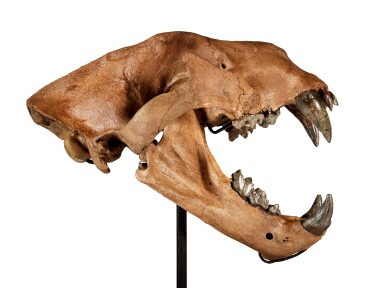Auctions
Buy Now
Collectibles & More
Books & Manuscripts
Natural History, including Gorgosaurus
Natural History, including Gorgosaurus

Auction Closed
July 28, 03:27 PM GMT
Estimate
400,000 - 600,000 USD
Lot Details
Description
Extinct American Lion Skull
Panthera atrox
Late Pleistocene (approx. 50,000 years ago)
Private Farm Property, Page County, Iowa
Skull with mandible and full set of teeth, 12¾ by 6½ by 7¾ inches (32.5 x 17 x 20 cm). 11¾ inches (29.8 cm) tall on custom stand. 6 pounds (2.7 kg).
A fossilized American Lion skull and mandible fossil attractively restored with incomplete sections accurately reconstructed. The front edge of the nose bones (nasals), back of lower jaw (ascending ramus), back of skull (occipital area), both ear bones (bullae), and right cheekbone (zygomatic arch) are reconstructed and restored, otherwise the skull and mandible are intact and close to complete. Two canines are intact, with the rest of the dentition exhibiting minor restoration and conservation work. The skull is mounted with jaws open, sitting atop a custom metal display stand.
Panthera atrox was one of the largest cats to ever exist, stalking the American continents for over 300,000 years before its extinction during the last Ice Age. Measuring nearly 8 feet (2.4 meters) from nose to tail and weighing over 900 pounds (408 kg), Panthera atrox exhibited overall body proportions both more robust and approx. 25% larger than today's African lions.
The North American Lion (also known as the "American Cave Lion") inhabited predominantly grasslands and savannahs, and was able to survive in both warm and relatively colder climatic conditions. Employing muscular arms and a powerful bite force, Panthera atrox preyed upon now-extinct animals including camels, ground sloths, armadillos, mammoths, mastodons, bison, and more.
Specifically, the robust Panthera atrox specimen offered here was unearthed in a Pleistocene deposit in southern Iowa alongside the remains of mammoth, elk-moose, bison, and the American cheetah, adding to the intrigue of a fossil suitable for both exhibit and research.